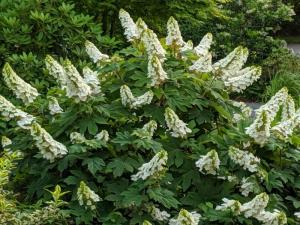Mill Pond Garden horse manure compost orders due Dec. 15
Mill Pond Garden recommends composted horse manure for best fertilization results, whether the garden is organically managed or not.
Some experts claim that petroleum-based chemical fertilizers do the same job. That’s not the opinion of Mill Pond Garden Director Michael Zajic and other experienced gardeners who have used animal waste and other organic compost for best growth.
Plant fertilization occurs when soil microbes enable the transfer of nutrients through root cell walls, thus feeding the plants.
Rich soil has lots of beneficial microbes with higher fertility, giving better results than soil poor in microbes. Chemical fertilizers, which are salts, kill the beneficial microbes in the soil, leaving the plant weaker and deficient in performance, nutrition and flavor, even if bigger. Almost everyone who has grown houseplants has seen older potted plants build up white salt deposits from fertilizer.
Salt kills beneficial soil bacteria, fungi and organisms. Salt is a preservative. Salting crops with chemicals for growth destroys the communities of microbes that are best for both soil health and people’s gut health. Plants do respond to chemical fertilizers but suffer while doing so, often developing diminished root systems.
Garden plants all do best if their soil is fed with organic nutrients which increase and diversify the microbial populations. Organic fertilizer is made from decayed plant or animal matter. Some natural minerals also help soil health and fertility including sulfur, calcium, magnesium and trace elements like zinc and other such metals. Plants use these to manufacture complex carbon-based compounds, enzymes, flavonoids and carbohydrates, fueled by the sugars created by chlorophyl, air and water, energized by sunlight.
The poop on poop is that it is a prime fertilizer because the animal has already composted the vegetation and enriched it with high populations of microbes. Manure is like a compost pile’s best results. However, not all manures are equal.
Horse manure is the best for plants and their performance. Composting with it will help vegetables flourish, flowers proliferate, and shrubs and vines bloom more abundantly than ever before. No stores sell fresh composted horse manure.
Chicken manure is dangerously hot, burns from too much nitrogen and stinks, though it is excellent used on lawns. Cow manure is too weak to make much difference over regular garden compost.
Horse manure is just right, with a perfect 6.8 pH, and great balance of nutrients and beneficial microbes. It is not the nutrients alone that do the magic; it is the mass of digested organic plant material loaded with beneficial microbes that will quickly push plants to abundant performance.
Manure must be freshly composted, and Mill Pond Garden plans to process and offer only what is made every year by staff gardeners. Advance orders will be taken so all that is produced gets used when it is composted to perfection. Using this superior gardening product will result in plants with healthier-looking, shiny leaves and increased robust growth with greater flowering. It can be used on houseplants, annuals, vegetables, perennials, flowering shrubs, trees and vines.
Mill Pond Garden processes horse manure compost for its own thriving plants and will make more to meet orders placed by Tuesday, Dec. 15, for 18-pound bags. Patrons will have perfect horse manure compost ready for pickup the first week of spring 2021.
To order, go to millpondgarden.com and click on the shop page. Gardeners can’t get this anywhere else.
Working to make the world a better place for all, Mill Pond Garden is a certified federal and state nonprofit, holistic public horticultural garden on Red Mill Pond at 31401 Melloy Court, Lewes.






















































